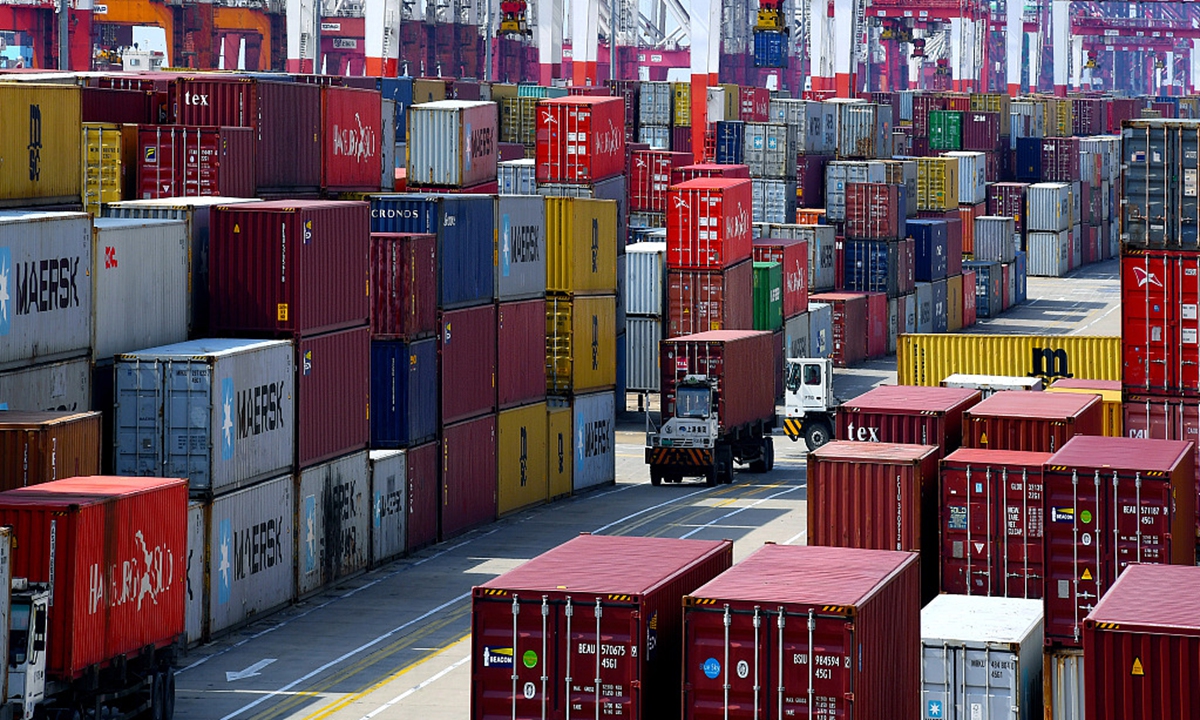China’s foreign trade sees robust growth in July, but pace slows amid uncertainties

Photo:VCG
China's foreign trade maintained a relatively strong growth for the 14th consecutive month in July, but the growth pace slowed down slightly from the previous month due to a slew of factors, including resurgence of the COVID-19 both at home and abroad, extreme weather conditions as well as fading base effect, official data showed on Saturday.
Total imports and exports in July grew 23.1 percent year-on-year to $508.74 billion, while trade during the first seven months of the year increased 35.1 percent to $3.3 trillion, according to the General Administration of Customs (GAC).
That marks the 14th consecutive month of growth in China's imports and exports and the growth of total trade in the first seven months still reached 22.3 percent compared with the same period in 2019 in yuan terms, Li Kuiwen, an official at the GAC, said on Saturday.
Nevertheless, the slower-than-expected growth rates in both exports and imports still reflected the uncertainties and challenges for the world's biggest trading nation. Exports in July grew by 19.3 percent year-on-year, slowing from the 32.2 percent growth seen in June, while imports rose 28.1 percent, easing from the previous month's 36.7 percent expansion.
The growth deceleration could be attributed to a series of factors, such as the spread of the Delta variant, severe weather conditions, the yuan's appreciation and fading base effect, experts said.
New locally-transmitted COVID-19 cases caused by the highly contagious Delta variant have spread to more than 10 provinces and regions, prompting local authorities to take strict anti-epidemic measures in some areas and suspend factory production, Bai Ming, deputy director of the international market research institute at the Chinese Academy of International Trade and Economic Cooperation, told the Global Times on Saturday.
Moreover, the severe rainstorm and flood disasters that hit Central China's Henan Province, a major manufacturing hub, may also have put pressure on the supply chains, experts noted.
Another important factor is the base effect, Bai noted. Considering that China's trade in the second half of 2020 registered a strong rebound, a slower growth based on a higher comparison base in the coming months could be expected.
Due to the volatility of the trade base recorded last year, it is difficult to judge the current pressure on foreign trade simply by those growth rates, Zhang Anyuan, chief economist with China Securities, told the Global Times on Saturday.
"As the Delta variant has brought new uncertainty to the global recovery, China's export performance will largely depend on whether China's complete and comprehensive industrial chains could continue to play a vital role in offsetting the disruptive impacts on the global supply chains," Zhang noted.
Despite the slower pace, China's trade with major partners expanded significantly. In the first seven months of 2021, China's trade with the US grew 28.9 percent year-on-year, faster than a 23.4 percent growth in trade with the EU and a 24.6 percent growth with ASEAN, China's largest trading partner, according to the GAC. Trade with countries along the Belt and Road Initiative also grew by 25.5 percent.
Specifically, China's imports from the US grew by 38.8 percent year-on-year, while exports grew 25.9 percent, resulting a 20.2 percent expansion in China's trade surplus with the US, according to the GAC.
In terms of products, exports of mechanical and electrical products expanded by 25.5 percent, while auto exports jumped 102.5 percent. Amid high prices, China's iron ore imports dropped by 1.5 percent year-on-year in the first seven months of the year, crude oil imports fell 5.6 percent and coal imports plunged by 15 percent. Natural gas imports grew 24 percent, while soybean imports rose 4.5 percent.
Going forward, "the precondition of maintaining the momentum of exports is to bring the epidemic under control as quickly as possible so as to restore the resilience of our industrial chain," Bai said.
